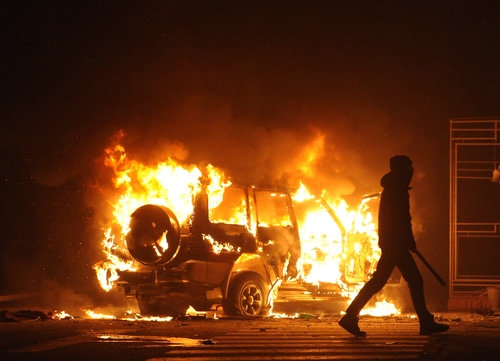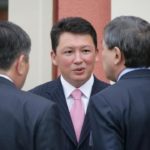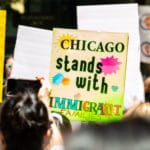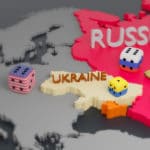Kazakhstan’s President Orders Shoot to Kill Protesters

Kazakhstan’s president said in a televised speech Friday that he ordered security forces to “shoot to kill without warning” in an attempt to forcibly suppress an unexpected uprising, adding that those who failed to surrender “need to be destroyed.”
Why it matters: “Dozens” of protesters have been killed and around 4,000 arrested, according to the government. At least 18 security forces have also been killed. A phone and internet blackout has made it virtually impossible to track events nationally, but the order will likely result in more deaths.
- President Kassym-Jomart Tokayev said he denied calls to hold talks with protesters, calling them foreign-backed “bandits” and “terrorists.”
Driving the news: Russian paratroopers arrived in Kazakhstan on Thursday as part of a regional peacekeeping mission requested by Tokayev.
- Kazakhstan, a major oil producer that shares long borders with both Russia and China, had been remarkably stable for decades. But within just a few days, a small-scale protest in a remote region evolved into an apparent national revolt, with protesters storming government buildings and briefly seizing an international airport.
The protests began over the weekend in western Kazakhstan after the government lifted a cap on fuel prices. They swiftly spread to Almaty, Kazakhstan’s largest city, and around the country.
- Gunfire continued to ring out overnight, the BBC’s Abdujalil Abdurasulov reported from Almaty.
- Criminal gangs reportedly took advantage of the chaos, which included widespread vandalism and looting in Almaty.
- Having denounced the protesters as “a band of international terrorists,” Tokayev now seems intent on suppressing the uprising by force.
The big picture: Kazakhstan is effectively a one-party state that has been dominated since independence from the Soviet Union by Nursultan Nazarbayev and his family and close associates.
- Nazarbayev handed power to Tokayev in 2019 in a stage-managed transition that left the ex-dictator as “Leader of the Nation” and chairman of the Security Council — and saw the capital renamed in his honor.
- Hopes that the transition would provide a political opening, raise living standards, or reform the kleptocratic system that’s left a tiny elite with a huge share of the national wealth have been unfulfilled, says Bruce Pannier, Central Asia correspondent for Radio Free Europe.
- Protests that began in 2019 would likely have continued if not for the pandemic, which provided the government with a pretext to ban public gatherings, Pannier notes. That helps explain why a small spark led to the current inferno.
On Wednesday, Tokayev removed Nazarbayev from the Security Council, possibly to appease the protesters chanting “old man, go away.”
- He also fired the country’s powerful security chief and dismissed the government.
- By calling for foreign backup, though, Tokayev risks undermining his own authority and Kazakhstan’s sovereignty.
Details: Stanislav Zas, secretary-general of the Russia-led Collective Security Treaty Organization (CSTO), said Thursday that the mission would include an initial 2,500 soldiers from Armenia, Belarus, Kyrgyzstan, Russia and Tajikistan and could last “several days to several weeks.”
- The CSTO says the soldiers will protect “important state and military facilities,” rather than cracking down on protesters.
- This is the alliance’s first-ever joint mission, and many observers were shocked that the request was made and then so swiftly accepted.
China, for which neighboring Kazakhstan is an important source of oil and key transport corridor for the Belt and Road Initiative, has been relatively quiet, though state media has noted Tokayev’s claim that the protesters had foreign backing.
- “China supports all efforts that help the Kazakh authorities calm the situation as soon as possible and firmly opposes external forces deliberately creating social instability and instigating violence in #Kazakhstan. We will make our utmost effort to provide necessary support,” China’s Foreign Ministry spokesperson Wang Wenbin said Friday in a tweet.
- The U.S., which also has relatively friendly relations with Kazakhstan, is also calling for calm without publicly pressuring the government. Secretary of State Antony Blinken issued a neutral statement after speaking with his Kazakhstani counterpart.
- For Vladimir Putin, ensuring a loyal government in a neighboring country that is a key military and economic partner and home to 3.5 million ethnic Russians is of vital importance, says Dmitri Trenin, director of the Carnegie Moscow Center.
Source: www.axious.com










